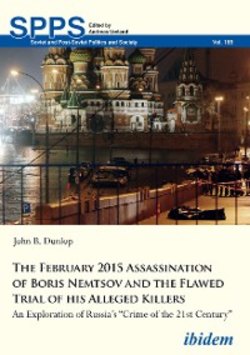Читать книгу The February 2015 Assassination of Boris Nemtsov and the Flawed Trial of his Alleged Killers - John B. Dunlop - Страница 4
Preface
ОглавлениеThe assassination of Boris Nemtsov, one of the two most important leaders of the Russian opposition, on a Moscow bridge at the very foot of the Kremlin, on 27 February 2015, on the eve of a mass protest march that he had co-organized, has been aptly termed the Russian crime of the relatively young twenty-first century. Due to the closed nature of Russian society and its tight control by an authoritarian regime, the truth concerning who committed this monstrous crime, and how it has been covered up, remains largely unknown. As I attempted to do in my previous book, The Moscow Bombings of 1999, I have sought to shed light on murky deeds carried out in darkness.1
I have been aided in this task by the pioneering work of a number of leading Russian analysts, who have relentlessly attempted to discover how, and by whom, the murder was carried out, and why. These analysts have uniformly had distinguished careers: Andrei Illarionov served as Putin’s chief economic advisor for five years; Vladimir Milov was Russian deputy minister for energy; Andrei Piontkovskii was a well-known Russian mathematician and Corresponding Member of the Russian Academy of Sciences; Leonid Martinyuk was an accomplished documentary filmmaker; and David Satter has for many years been a top contributor to the Wall Street Journal and other publications covering the USSR and post-communist Russia. All of them were personally acquainted with the victim. Finally, Petersburg attorney Igor Murzin, a specialist on CCTV and other visual and road monitoring systems relating to auto accidents occurring on roads and bridges, has provided key information concerning how the murder took place.
In addition, I have devoted one chapter each to the views of the prosecution, the defense, and the Nemtsov family attorneys, as they were presented over a nine-month period during the trial of Nemtsov’s accused killers.
A note on the correct translation of one key Russian word that crops up often in this manuscript. The word zakazchik means literally “the person who ordered up [zakazal] the murder.” There appears to be no precise English equivalent for this term. The word “mastermind” is often chosen by translators, but this term can be misleading. The words sponsor, initiator, or contractor would seem to be more accurate. In the Nemtsov killing, one can quite easily posit a sponsor, plus one or several sub-sponsors, as well as those individuals who organized the crime further down the chain of command.
This study does not offer a detailed biographical sketch of the late Russian politician, who died at age fifty-five. A useful source for Nemtsov’s biography is a documentary film, Nemtsov, made by Russian political activist Vladimir Kara-Murza.2 This film does not cover the assassination itself. A film which does is Leonid Martinyuk’s documentary “That doesn’t mean you have to kill him,” made in cooperation with Andrei Piontkovskii.3 The title of the film refers to words spoken by Vladimir Putin following Nemtsov’s killing. The documentary’s premiere occurred in October of 2016 and thus it was unable to include key information that came to light subsequently (e.g., the making public of the materials of the criminal case by lawyer Igor Murzin, and the extensive comments on them made by journalist David Satter).
I also want to acknowledge here the generous assistance I have received from Martin Dewhirst of the University of Glasgow, who read through all the chapters in this book and made numerous useful suggestions on how to improve the text.
Concerning Nemtsov, I will repeat what has been said about him by his numerous friends and admirers, both in Russia and the West. He was a highly intelligent, extraordinarily energetic, unfailingly courageous politician, who was self-evidently prepared to die for his democratic convictions. Like numerous admirable high-level Western politicians, both contemporary and past, Nemtsov was far from perfect, with his womanizing being his most salient flaw (one reported unblinkingly in Kara-Murza’s film). In the context of Putin’s repressive regime, Nemtsov’s womanizing represented a dangerous weakness that could be, and indeed was, cynically probed and exploited by the Russian special services. None of this, however, should detract from Nemtsov’s unique political achievements, or from his deserved status as a luminous martyr, worthy of the name of St. Boris the Russian martyr, whose icon was found by investigators on his body as it lay on the bridge.
On 27 February 2018, on the third anniversary of the assassination, a stretch of the Northwest Washington road outside the Russian Embassy was officially unveiled by U.S. lawmakers and D.C. Council members as “Boris Nemtsov Plaza.” “The street sign directly outside the Russian Embassy,” Senator Marco Rubio, Republican of Florida, declared on this occasion, “will serve as an enduring reminder to Vladimir Putin and those who support him that they can’t use murder and intimidation to silence the voices of freedom.” Those gathered in the square, Senator Christopher Coons, Democrat of Delaware, noted, “know that someday, someday Russia will be free again. This embassy will [then] be honored again by the name Boris Nemtsov.”4 Honored abroad, Nemtsov will eventually, and perhaps sooner than one might think, find acceptance and deep respect in his long-suffering homeland.
1 See: John B. Dunlop, The Moscow Bombings of September 1999: Examinations of Russian Terrorist Attacks at the Onset of Vladimir Putin’s Rule (Stuttgart: ibidem Verlag, second expanded edition, 2014.) For a map showing the site of Nemtsov’s murder, see: “Mapping Boris Nemtsov’s assassination,” Brown Political Review, 16 March 2015 https://www.brownpoliticalreview.org/ 2015/03/mapping-boris-nemtsovs-assassination/
2 This film is accessible on You Tube: https://www.youtube.com/watch ?v=v2E3ybT9KTA
3 For the English version of Martinyuk’s film, see: https://en.nemtsov-most.org/2016/10/20/premier-of-the-film-that-doesnt-mean-you-have-to-ki ll-him-film/
4 See: “Street signs outside Russian embassy in Washington now honor slain dissident,” washingtonpost.com, 27 February 2018.
